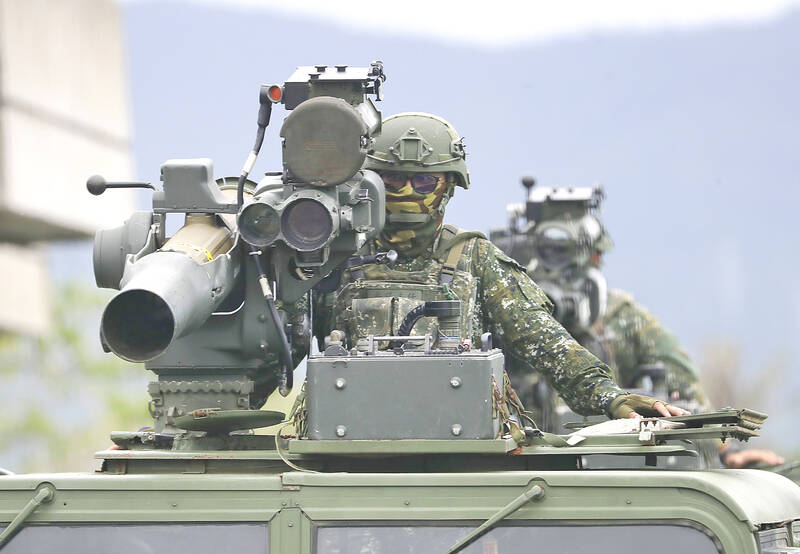The National Defense Act (國防法) should be amended to require technology transfers to Taiwan in cases of international cooperation on weapons research and development, Democratic Progressive Party (DPP) lawmakers said.
President William Lai (賴清德) recently announced that he would raise the defense budget to more than 3 percent of GDP by allocating a special budget for it, given the growing threat from China.
DPP legislators Chiu Chih-wei (邱志偉) and Lin Chun-hsien (林俊憲) on Sunday said that part of the budget would go toward increased arms procurements from the US, but Taiwan should also seek to develop its own arms industry through an amendment to Article 22 of the National Defense Act.

Photo: Chiang Ying-ying, AP
The article states: “When it is necessary to pursue outsourcing channels, the acquisition activities shall realize technology transfer policy so as to establish an autonomous national defense infrastructure.”
Under Chiu and Lun’s proposed amendment, the article would stipulate that a technology transfer should also be implemented when “conducting international cooperation in the research and development, production, or maintenance of related weapons and equipment in order to achieve national defense independence and safeguard Taiwan’s security goals.”
The US supports Taiwan’s acquisition of defense equipment through multiple channels, including independent research and development, and technology transfers, to connect with the international supply chain, Chiu said.
“Taiwan faces challenges caused by the delayed delivery of US arms,” he said. “To strengthen Taiwan’s national defense and self-defense capabilities, it is crucial to actively promote the Taiwan-US joint weapons production plan.”
Taiwan should strive to obtain original manufacturer certification and promote the development of its domestic industry through international cooperation and investment, Chiu said.
To facilitate that, articles 10 and 19 of the Defense Industry Development Act (國防產業發展條例) should be amended, he said.
Current provisions limit cooperation with foreign suppliers on the research, production, manufacture and maintenance of military defense supplies, except in the case of a “special necessity,” with the approval of a competent authority in consultation with other authorities in charge, Chiu said.
In some cases, the involvement of other ministries or agencies might be required to procure foreign materials or supplies. For example, in the sourcing of key components and raw materials for drones, the Ministry of Transportation and Communications might be involved, he said.
However, the ministry would be outside of the scope of authorities defined under the current regulations, so the draft article amends that by including “relevant agencies,” he said.
“Implementing the transfer of key technologies associated with research and development or production and expanding the defense industry market would contribute to the country’s long-term security and development,” he said. “Many countries adopt flexible and diversified supply strategies to avoid monopolizations of the sources of key military components and raw materials.”

“China is preparing to invade Taiwan,” Deputy Minister of Foreign Affairs Francois Wu (吳志中) said in an exclusive interview with British media channel Sky News for a special report titled, “Is Taiwan ready for a Chinese invasion?” the Ministry of Foreign Affairs said today in a statement. The 25-minute-long special report by Helen Ann-Smith released yesterday saw Sky News travel to Penghu, Taoyuan and Taipei to discuss the possibility of a Chinese invasion and how Taiwan is preparing for an attack. The film observed emergency response drills, interviewed baseball fans at the Taipei Dome on their views of US President

The Central Weather Administration (CWA) today issued a "tsunami watch" alert after a magnitude 8.7 earthquake struck off the Kamchatka Peninsula in northeastern Russia earlier in the morning. The quake struck off the east coast of the Kamchatka Peninsula at 7:25am (Taiwan time) at a depth of about 19km, the CWA said, citing figures from the Pacific Tsunami Warning Center. The CWA's Seismological Center said preliminary assessments indicate that a tsunami could reach Taiwan's coastal areas by 1:18pm today. The CWA urged residents along the coast to stay alert and take necessary precautions as waves as high as 1m could hit the southeastern

The National Museum of Taiwan Literature is next month to hold an exhibition in Osaka, Japan, showcasing the rich and unique history of Taiwanese folklore and literature. The exhibition, which is to run from Aug. 10 to Aug. 20 at the city’s Central Public Hall, is part of the “We Taiwan” at Expo 2025 series, highlighting Taiwan’s cultural ties with the international community, National Museum of Taiwan Literature director Chen Ying-fang (陳瑩芳) said. Folklore and literature, among Taiwan’s richest cultural heritages, naturally deserve a central place in the global dialogue, Chen said. Taiwan’s folklore would be immediately apparent at the entrance of the

Speeding and badly maintained roads were the main causes of a school bus accident on a rainy day in Taipei last year that severely injured two people and left 22 with minor injuries, the Taiwan Transportation and Safety Board said. On March 11 last year, a Kang Chiao International School bus overturned inside the Wenshan Tunnel (文山隧道) on the northbound lane of the Xinyi Expressway. The tour bus, owned by Long Lai Co, exceeded the speed limit after entering the tunnel, the board’s investigation found. Sensing that the rear of the vehicle was swaying, the driver attempted to use the service and exhaust